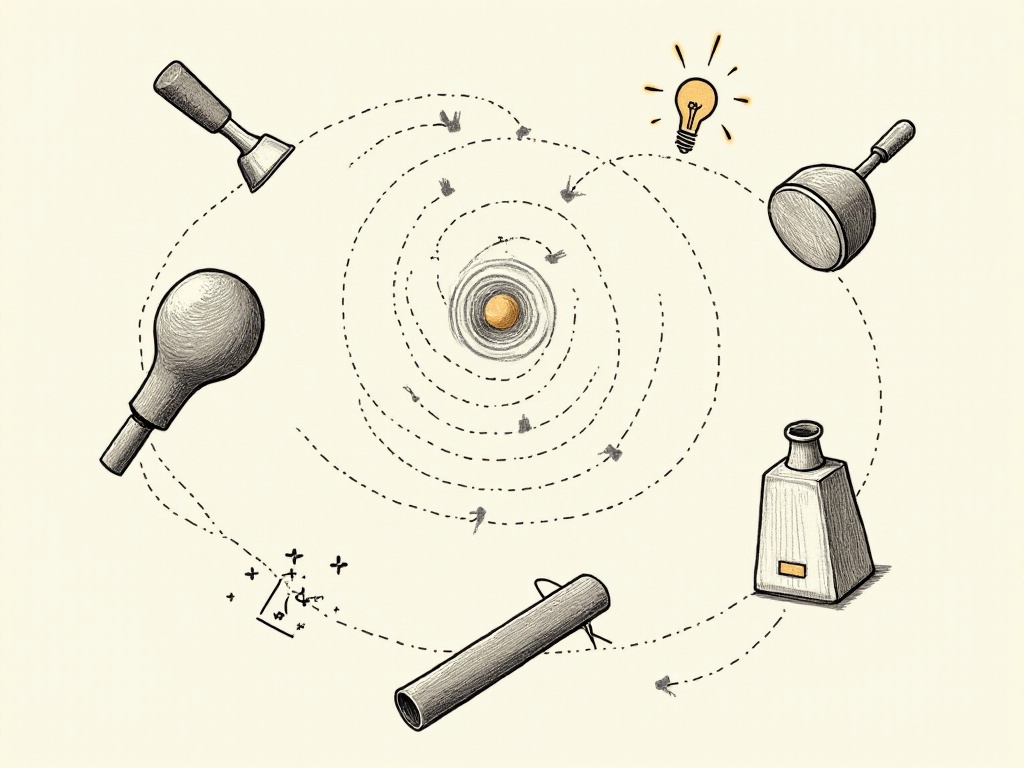
Initial Thoughts
To be honest, I've been under tremendous pressure lately. Work deadlines chasing me, social circles filled with people getting married and having children, social media flooded with various milestones, and the pressure of mortgage and car payments weighing like mountains... Every day I wake up feeling breathless, as if something invisible is pressing down on me. I know many of you feel the same way, otherwise there wouldn't be so much discussion about "involution" and "lying flat."
Recently, I discovered a particularly reliable method for stress relief, learned from famous speaker Mel Robbins. I've tried it for a while, and the results are really impressive, so I'd like to share it with you today.
The Sword Metaphor
Mel Robbins says that everyone is tightly gripping an invisible sword. This sword represents our various negative emotions. Think about it - when we're anxious, aren't we completely tense? It's like holding an extremely heavy sword, both exhausting and uncomfortable.
This sword not only weighs heavily but becomes increasingly heavier over time. For example, when you feel bad about something your boss said at work, if these emotions aren't dealt with promptly, they accumulate. By the time you're off work, what should be a happy dinner with friends becomes clouded by brooding over work issues. When you should be resting well at home, you're instead tossing and turning in bed, thinking "I should have responded differently."
This situation is too common around us. Some friends choose to cope through excessive shopping; others drink alone; some lock themselves in their rooms and binge on snacks... But these methods only treat the symptoms, not the root cause, and might even bring new troubles.
The Art of Awareness
The first step in putting down this sword is recognizing that you're "gripping" it. This is really important because often we don't even realize we're in a state of tension.
Take myself for example - previously during meetings, I would unconsciously shake my leg, bite my nails, and end up with terribly sore shoulders afterward. On the subway, I'd get particularly anxious if my phone died, as if I might miss something important. During video calls with parents, I'd argue over trivial matters. Looking back now, these were all signs of "gripping the sword."

Common "Sword-Gripping" Scenarios
Speaking of "sword-gripping" scenarios, there are many. Observing my friends, I've noticed several particularly typical situations:
First is the state before work presentations. I remember once when I had to give an annual summary to company executives, I couldn't sleep at all the night before, revised the PPT countless times, and rehearsed potential questions hundreds of times in my head. From what I understand, over 75% of professionals have similar experiences. Some get stomach aches, others feel dizzy, and some even develop gastroenteritis.
Second is social situations. Many young people now have social anxiety, becoming anxious about meeting friends. Data shows that approximately 60% of young people feel uncomfortable in social situations. For instance, at class reunions, what should be a time to catch up becomes uncomfortable due to fear of comparison. Or attending a friend's wedding, seeing others' happiness leads to anxiety about being single.
The most troublesome is bedtime. Surveys show that nearly 70% of urban white-collar workers suffer from insomnia due to inability to stop thinking about work. I used to be like this - despite being tired, lying in bed would trigger thoughts about various details from the day: things said wrong in meetings, colleagues' expressions, project progress... The more I thought, the more awake I became, the more anxious I got, creating a vicious cycle.

Techniques for Letting Go
Once you recognize you're "gripping the sword," the next step is learning to let go. This process can be both difficult and simple. I've compiled three particularly practical methods:
Physical Relaxation
Let's start with the most basic: focusing on breathing. This technique sounds simple, but the effects are truly amazing. Psychological research shows that taking three deep breaths can reduce sympathetic nervous system excitation by 30%. How exactly do you do this?
My method is: find a relatively quiet place, whether it's a corner of the office or the bathroom (yes, often the bathroom is the last refuge). Then close your eyes, inhale slowly, feel the air enter through your nose, fill your chest cavity, and slowly exhale. During this process, focus completely on your breathing, don't think about anything else.
If breathing alone doesn't feel enough, you can combine it with some simple stretching exercises. For example, slowly rotate your neck while deep breathing, or gently massage your temples. These movements can help relax tense muscles.
A yoga instructor friend taught me a particularly useful trick: while lying down, first tense all your muscles, hold for a few seconds, then suddenly relax. This sudden relaxation gives your body a particularly comfortable feeling.
Thought Restructuring
Relaxing the body alone isn't enough; adjusting your mindset is more important. When you find yourself "gripping the sword," learn to ask yourself several questions:
"Is this really worth getting so tense about?" "Would the situation look different from another perspective?" "Will this still matter a year from now?"
For example, I used to be very concerned about colleagues' evaluations. Once, when a project wasn't done well, a colleague pointed out problems face-to-face. I felt terrible at the time, feeling like I'd lost face. But later I thought, if roles were reversed, I would also point out problems in colleagues' work - it's about doing things well, not personal attacks. Understanding this made me feel much better.
Another useful thinking method is the "worst-case scenario." Imagine what the worst outcome could be. For example, if you're worried about giving a poor work presentation, the worst that could happen is getting criticized or affecting your year-end evaluation. But these aren't fatal - life goes on. Understanding this naturally reduces much of the pressure.

Behavioral Change
Thinking alone isn't enough; you need to take action. I've summarized several particularly practical tips:
During meetings, if you find yourself clenching your fists or shaking your leg, try placing your hands on the table and feet flat on the floor. This simple action can help us regain a sense of bodily control.
When speaking, if you notice yourself talking particularly fast, deliberately slow down your pace. Rapid speech is often a sign of nervousness; slowing down not only helps others understand us better but also helps us stay calmer.
When facing work pressure, don't bear it alone. You can talk to trusted colleagues; they might have similar experiences and could offer good advice.
Rest properly during break times. Many people now check work-related messages on their phones during lunch breaks, which actually reduces afternoon work efficiency. Instead, take a ten-minute power nap or go for a walk, allowing both body and mind to truly relax.

Practical Experience
Honestly, when I first started practicing these techniques, it felt a bit awkward. After all, changing a habit takes time. But after persisting for a month, I really noticed significant changes.
First, work efficiency improved. Previously, being constantly tense made me more prone to errors. Now, learning to relax at appropriate times has increased efficiency by about 20%, and work quality has improved too.
Interpersonal relationships have also improved significantly. Being less prone to tension and anxiety has made interactions with colleagues and friends more natural. I used to feel I had to appear perfect in front of others; now I can accept my imperfections, which actually makes relationships more genuine.
The most noticeable change is in sleep quality. I used to suffer from insomnia, would wake easily, and couldn't fall back asleep. Now I take several deep breaths before bed, thinking about "putting down that sword," and my sleep quality has improved greatly. Waking up feeling refreshed makes the whole day different.

Extended Thoughts
While practicing this method, I've gained new insights about life. Often, our suffering comes not from situations themselves but from our attitudes toward them. Like that invisible sword, its weight is largely added by ourselves.
I've discovered that when we can let go of unnecessary attachments and anxieties, many problems become simpler. For instance, with work pressure, rather than being constantly on edge, it's better to focus on doing each task well. With social anxiety, rather than worrying about others' opinions, it's better to be authentic.
This process has also helped me understand that life isn't a competition; we don't need to be tense all the time. Sometimes, slowing down and giving ourselves space to breathe actually helps us go further.

Conclusion
Now, do you also feel you're holding an invisible sword? Whether it's due to work pressure, life troubles, or uncertainty about the future? Whatever the reason, try using this method to gradually put down your inner burden.
Remember, true strength isn't about clenching your fists, but learning when to let go. When we put down that invisible sword, we discover life can be much lighter.
If you want to try this method, I suggest starting small. Tonight before bed, try taking a few deep breaths; tomorrow at work, pay attention to your posture; when chatting with friends, slow down your speech. Take it slowly, and you'll notice the changes.
Finally, I hope everyone reading this article can find their own way to relax and live a light, free life. After all, life is short, why take everything so seriously? Put down that sword, and let's move forward lightly to embrace a better tomorrow.
Next
Practical Life Tips: From Theory to Practice, Making Your Life Easier and More Comfortable
A comprehensive guide exploring life hacks for productivity and efficient home management, combined with detailed insights into Chinese traditional festivals, focusing on Spring Festival customs, New Year's Eve preparations, and family reunion traditions
I Spent a Month Researching Life Hacks and Compiled This Guide to Dramatically Improve Quality of Life
A comprehensive guide covering practical life hacks and Chinese traditional festival customs, including home organization, kitchen management, cleaning tips, and cultural insights into Spring Festival, Lantern Festival, and Winter Solstice celebrations
21 Days to Transform Your Eating Habits: Making Healthy Living Less Burdensome
A comprehensive guide covering balanced nutrition, dietary control, exercise recommendations, and essential healthcare practices to help readers establish a scientific and healthy lifestyle
Next

Practical Life Tips: From Theory to Practice, Making Your Life Easier and More Comfortable
A comprehensive guide exploring life hacks for productivity and efficient home management, combined with detailed insights into Chinese traditional festivals, focusing on Spring Festival customs, New Year's Eve preparations, and family reunion traditions

I Spent a Month Researching Life Hacks and Compiled This Guide to Dramatically Improve Quality of Life
A comprehensive guide covering practical life hacks and Chinese traditional festival customs, including home organization, kitchen management, cleaning tips, and cultural insights into Spring Festival, Lantern Festival, and Winter Solstice celebrations

21 Days to Transform Your Eating Habits: Making Healthy Living Less Burdensome
A comprehensive guide covering balanced nutrition, dietary control, exercise recommendations, and essential healthcare practices to help readers establish a scientific and healthy lifestyle

